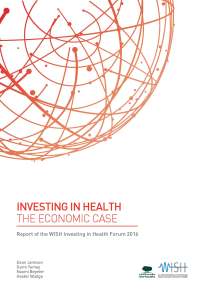 Developing country governments and aid agencies face difficult decisions on how best to allocate their finite resources. Investments in many different sectors – including education, water and sanitation, transportation, and health – can all reap social and economic benefits. This report, ‘Investing in health: The economic case’, which is to be discussed at today’s World Innovation Summit for Health (WISH) focuses specifically on the health sector. It presents compelling evidence of the value of scaling-up health investments. The economic case for increasing these investments in health has never been stronger.
Developing country governments and aid agencies face difficult decisions on how best to allocate their finite resources. Investments in many different sectors – including education, water and sanitation, transportation, and health – can all reap social and economic benefits. This report, ‘Investing in health: The economic case’, which is to be discussed at today’s World Innovation Summit for Health (WISH) focuses specifically on the health sector. It presents compelling evidence of the value of scaling-up health investments. The economic case for increasing these investments in health has never been stronger.
Having made progress in reducing maternal and child mortality, and deaths from infectious diseases, it is essential that policymakers do not become complacent. These gains will be quickly reversed without sustained health investments. Scaled-up investments will be needed to tackle the emerging non-communicable disease (NCD) burden and to achieve universal health coverage (UHC).
Report focus
 This report presents compelling evidence of the value of scaling-up health investments, addressing three key questions:
This report presents compelling evidence of the value of scaling-up health investments, addressing three key questions:
- What is the economic rationale for investing in health?
- What is the best way to finance health?
- Which interventions should be prioritised?
Report insights
The report insights are organised around answers to the above three key questions:
- Investing in health is an investment in economic prosperity through multiple pathways:
- Education – well-nourished children are more likely to go to school and to further their education, which is linked to higher earnings in adulthood.
- Productivity – healthy people work harder and better, and are less likely to take days off.
- Investment – people are more likely to save money when they expect to live longer and businesses are more likely to invest in countries with healthier populations. • Resources – access to natural resources is opened up when endemic diseases such as malaria are tackled.
- Demographics – when mortality rates fall, women have fewer children, which temporarily increases the ratio of working-age people to their dependents.
- Without public financing there will be individuals who cannot afford the care they need, resulting in sickness, and potential mortality and financial ruin. This is a devastating choice that pushes 150 million people into poverty every year.
- Investing in interventions that are targeted to local needs is the fastest and most effective way to reduce mortality. Dramatic health improvements are possible through scaling-up best buys, even when social and economic conditions are poor. These interventions provide high levels of health and financial protection with impressive economic returns.
Further Reading
Read the full report here.
Read all the WISH forum reports here.
About the World Innovation Summit for Health (WISH)
WISH focuses on some of the most pressing global health challenges facing governments, health systems and populations. WISH brings together internationally renowned experts, who work with advisory groups to publish evidence-based reports on a range of healthcare topics each year.
Chaired by a team of experts drawn from academia, industry and policymaking, the WISH Forums look in depth at the challenges faced in each area – surveying the literature and interviewing experts in the field. The Forum reports present some of the very best innovations that have been shown to have real impact across the developed and the developing world.
During the Summit, the Forum reports will form the basis of a series of panel discussions hosted by leading experts. The Chair of each Forum will open the panel discussion, focusing on ways key issues can be tackled and considering some of the available innovations that might help.
For further information about WISH and previous conferences, visit their website.